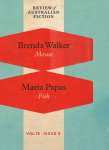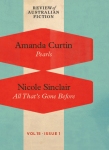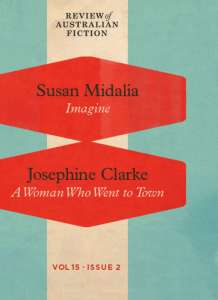Just out, the final issue in the special WA volume of Review of Australian Fiction, guest edited by Laurie Steed. And what a finale, with tense, intriguing stories from David Whish-Wilson and Sam Carmody.
Established author David Whish-Wilson has published three crime novels, two of which (Line of Sight and Zero at the Bone) are set in 1970s Perth. His next, Old Scores, is forthcoming from Fremantle Press in 2016. He is also the author of Perth, in NewSouth Books’ city series. David coordinates the creative writing program at Curtin University.
David is paired with emerging writer Sam Carmody, whose debut novel, The Windy Season, was shortlisted for the 2014 Vogel Award and will be published by Allen & Unwin in 2016. His short fiction and non-fiction have been published widely, including in Griffith Review and ABC’s The Drum. Sam currently lectures in creative writing at the Batchelor Institute of Indigenous Higher Education, Darwin.
David’s story, ‘Speedboats & Bali’, creates two characters I won’t be forgetting. The first-person narrator, whose singular character and intentions are revealed gradually through the story, introduces us to the second in this opening paragraph:
Butcher Bowse scratches his scalp through his bucket hat, turning the dial on his portable radio. It’s Nova FM, excruciating, but a small price to pay for Butcher’s landing the contract. It’s a hot summer afternoon, sea breeze knocking about the treetops. Seagulls are flying to coast, gorged on scraps from the nearby rubbish tip, noisy in the sky. Butcher surveys the scene, framing the worksite in his imagination. Perhaps he’s remembering the last time he worked in my elderly neighbour’s garden, building her deck. He built the deck then realised his trailer was parked in the back yard, blocked in. He had to remove a section of our shared fence to get it out. More likely, Butcher doesn’t remember. He wouldn’t be able to rise before dawn every morning if confronted daily with his incompetence.
Sam’s story, ‘Stark’, is at once harsh and tender. We see the fictional west coast town in which the story is set through the eyes of a recent arrival, senior detective Freda Harvey (Fred). The story begins with a murder:
The call came at five in the morning, patched through from Marine Rescue in Geraldton. Fred had been in bed just an hour when her phone rattled the cabinet. She reached for it through the cider bottles and tumblers.
A cray boat had found a body offshore, tied to a marker. The skipper said it looked biblical, the operator told her. A twenty-mile crucifix. They were waiting for a helicopter in Perth to fly out. The boat from Geraldton would take four hours.
She would beat them to it.
Fred threw the phone to the bedsheets and swore her way to the bathroom, peeling off last night’s clothes. Her shirt sweat-fused to the hollow of her back. The seam of her denim jeans twisted around to her shins, gripping as though glued to her.
I have loved reading this volume of RAF, which has showcased the work of some of my favourite WA writers and introduced me to new ones. My thanks to Laurie Steed for inviting me on board, and to the RAF editors for supporting Australian writers in general and, with this volume, twelve from WA.
RAF publishes two stories every two weeks, delivered in mobi (for Kindle) or ePub (for iPhone/iPad, Kobo, Nook, Readmill) format. Individual issues of RAF are $2.99. A subscription for six issues is $12.99.












